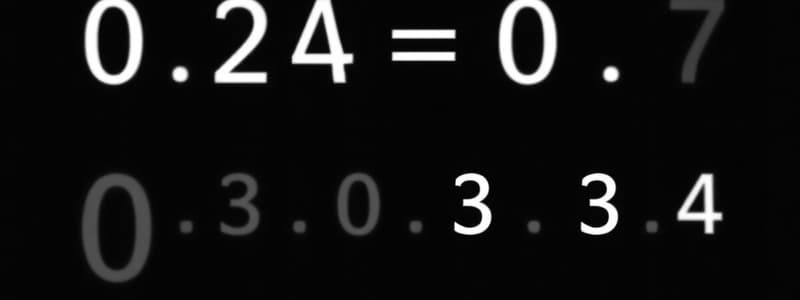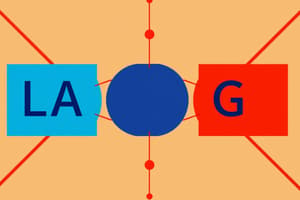Podcast
Questions and Answers
Which of the following Boolean algebra expressions is equivalent to the expression $A + AB$?
Which of the following Boolean algebra expressions is equivalent to the expression $A + AB$?
- $AB$
- $A + B$ (correct)
- $A + A$
- $A + C$
According to DeMorgan’s first theorem, the complement of a product of variables is equal to the product of the complemented variables.
According to DeMorgan’s first theorem, the complement of a product of variables is equal to the product of the complemented variables.
False (B)
What is the purpose of DeMorgan's Theorem in Boolean algebra?
What is the purpose of DeMorgan's Theorem in Boolean algebra?
It provides a systematic way to simplify expressions involving complements and products.
DeMorgan's first theorem states that the complement of a product of variables is equal to the sum of the __________ variables.
DeMorgan's first theorem states that the complement of a product of variables is equal to the sum of the __________ variables.
Match the following Boolean operations with their corresponding expressions:
Match the following Boolean operations with their corresponding expressions:
What does DeMorgan's 2nd Theorem state?
What does DeMorgan's 2nd Theorem state?
DeMorgan's 1st Theorem states that XY = X + Y.
DeMorgan's 1st Theorem states that XY = X + Y.
What is the result of applying DeMorgan’s theorem to the expression X = C + D?
What is the result of applying DeMorgan’s theorem to the expression X = C + D?
According to DeMorgan's Theorem, A + B is equal to ______.
According to DeMorgan's Theorem, A + B is equal to ______.
Match the following components with their corresponding operation:
Match the following components with their corresponding operation:
Flashcards
A + AB = A + B
A + AB = A + B
A Boolean algebra rule stating that adding a term to a sum with that term and another term simplifies to the term plus the other term.
(A + B)(A + C) = A + BC
(A + B)(A + C) = A + BC
A Boolean algebra rule stating that the product of two sums simplifies to a sum of two terms.
DeMorgan's 1st Theorem
DeMorgan's 1st Theorem
The complement of a product of variables is equal to the sum of the complemented variables.
AB = A + B
AB = A + B
Signup and view all the flashcards
DeMorgan's Theorem
DeMorgan's Theorem
Signup and view all the flashcards
DeMorgan's 2nd Theorem
DeMorgan's 2nd Theorem
Signup and view all the flashcards
Complement of a sum
Complement of a sum
Signup and view all the flashcards
Product of complemented variables
Product of complemented variables
Signup and view all the flashcards
DeMorgan's Theorem 1
DeMorgan's Theorem 1
Signup and view all the flashcards
DeMorgan's Theorem 2
DeMorgan's Theorem 2
Signup and view all the flashcards
Study Notes
Course Information
- Course Title: CS221: Logic Design
- Instructors: Dr. Ahmed Shalaby, Dr. Fatma Sakr
- Website (for instructor Ahmed Shalaby): http://bu.edu.eg/staff/ahmedshalaby14#
Digital Fundamentals
- Textbook: Digital Fundamentals, 9th edition by Floyd
Chapter 4: Boolean Algebra and Logic Simplification
- Boolean Algebra
- Variables represent actions, conditions, or data
- Variables have values of 1 or 0
- Complement: the inverse of a variable (indicated by an overbar)
- Literal: a variable or its complement
- Boolean Operations
- Addition (OR): the sum term is 1 if one or more literals are 1, and 0 only if all literals are 0.
- Multiplication (AND): the product term is 1 only if all literals are 1.
- Boolean Algebra Laws and Rules
- Commutative: A + B = B + A and AB = BA
- Associative: A + (B + C) = (A + B) + C and A(BC) = (AB)C
- Distributive: A(B + C) = AB + AC
Rules of Boolean Algebra
- A + 0 = A
- A + 1 = 1
- A · 0 = 0
- A · 1 = A
- A + A = A
- A + A = 1
- A · A = A
- A · A = 0
- 𝐴 = 𝐴
- A + AB = A
- A + AB = A + B
- (A + B)(A + C) = A + BC
DeMorgan's Theorem
- DeMorgan's First Theorem: (AB) = A + B
- DeMorgan's Second Theorem: (A + B) = A · B
Boolean Analysis of Logic Circuits
- Karnaugh Maps (K-maps)
- Used to simplify combinational logic
- 3 or 4 variables are used
- Cells are grouped to simplify expressions
- SOP (Sum of Products): expression where two or more product terms are summed
- POS (Product of Sums): expression where two or more sum terms are multiplied
- Standard forms: Every variable must appear in each term of the expression
- Simplifying Boolean expressions using the rules of Boolean algebra and K-maps. Examples of applying the rules provided with steps.
Studying That Suits You
Use AI to generate personalized quizzes and flashcards to suit your learning preferences.




